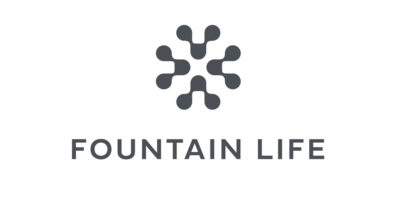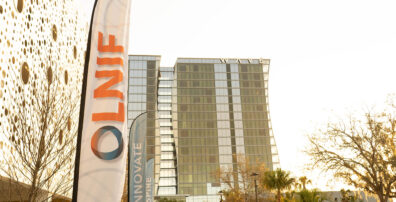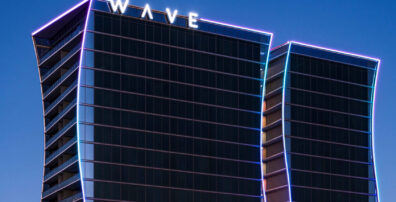“Less than one decade ago, some leaders thought plans for Lake Nona would never materialize,” said UCF President Dr. John Hitt as he welcomed Forum attendees on day two. “Now, Lake Nona is said to be the biggest economic game changer for Central Florida since Walt Disney World.”
And the Medical City is certainly a beacon for hope. “Because our community dared to dream big, Lake Nona has become a model for the nation,” he said.
With that inspirational note, Scott Wapner, CNBC host of of “Fast Money Halftime Report,” took the stage to set the framework for the day. “Today we’re going to hear from those who have used their own entrepreneurial spirit to transform the way we live our lives,” he said. “Unique business opportunities have clearly been created from this new health care model that we are all living in today.”
And we can certainly learn from those already leading the way. Take Mark Verstegen, for example. He launched API-Core Performance. He addressed what can we learn about proactive health and performance from elite athletes. We marvel at their seemingly superhuman prowess, as well as their determination, motivation and their ability to recover. What is it about their training that could apply to the rest of us seeking optimal health?
“Every day is game day,” he said. But the most important thing to remember is, “we have to realize that we are dealing with people.”
One thing to keep in mind, he said, is that “we need to practice what we preach. Sometimes our health givers are the least cared for population out there. These are the ones providing your services. If we don’t upgrade them, that’s going to affect the outcomes of all our organizations.”
A Conversation with Kevin Plank, CEO Under Armour
Up next was Kevin Plank, CEO and founder of Under Armour, who continued the conversation about entrepreneurship and proactive health.
CNBC’s Scott Wapner introduced Plank as a guy who “literally turned his sweat into a $2 billion business.” Today, Plank’s focus on innovation empowers not only athletes but everyday people who strive for healthy living.
Scott Wapner, Host of CNBC’s “Fast Money Halftime Report” and Kevin Plank, CEO, Under Armour
Where exactly does this sort of drive come from, Wapner asked? “I always enjoyed creating a team of people with a shared vision,” said Plank. “Entrepreneurship is something that we try to teach, but I think you have to inspire the culture. It’s a 360-degree approach. It has to come from all facets and assets of your body.”
And the road is never easy. “Entrepreneurship is a painful process,” he said. “You want to be known and to be recognized, but it takes a really long time for that to happen. In those early stages there’s no one thing. There’s simply the entrepreneur who finds a way to get it done. I knew I’d go broke before I made a nickel.”
A New Era of Engagement: Maximizing Optimization & Personalization to Foster Wellness
Daniel Amen, MD, CEO of Amen Clinics, Sharecare CEO Jeff Arnold, Delos Living Founder Paul Scialla, Fitness expert and trainer on ‘The Biggest Loser’ Dolvett Quince, Tictrac Co-Founder Jeremy Jauncey, and Cleveland Clinic Chief Wellness Officer Michael Roizen, MD
The panel discussion focused on “the person” – the consumer, patient, caregiver — and how we inspire this person using technology to change their lives. The main question here is: Can you change the health of the population with a return on investment that makes sense for an organization?
The biggest problem we have, of course, is medical costs, which are constantly soaring across the country and world. “The only way we can bend this curve to flat, is if we can decrease the influx of chronic disease,” said Michael Roizen, Cleveland Clinic Chief Wellness Officer. “We have the most disease in the world between ages 55 and 65 years old.” The four factors causing this are tobacco, food choice/portion size, physical inactivity and stress. Stress is the most important factor.
Roizen told the audience about a case study of a patient who was able to lose 43 pounds, control his type 2 diabetes and get rid of his osteoarthritis. Part of the success was due to personal touch formed through email updates. “It was our way of nudging him,” Roizen said. And the combination of technology, care and consistency worked. The patient’s healthier lifestyle saved $30,000 direct costs because of the foods and health issues he avoided.
He also engages patients by using MyChart, where they can review suggestive care maneuvers, book doctors appointments, etc., and Wellness Widget, where patients enter their own data on an iPad.
Founding a New Industry – The Canyon Ranch Story
Due to an asthmatic condition, Mel Zuckerman, founder of The Canyon Ranch and a pioneer in health and wellness, was told he couldn’t exercise as a child. So he didn’t. For 40 years. Until he ended up in a “fat farm.”
That’s when he had his aha moment. When he discovered that he actually could exercise, he felt empowered. “I was feeling like I had never felt in the first 50 years of my life,” he said. “I need to feel this way for the rest of my life. I lost 30 pounds in 4 weeks.”
He immediately wanted to pass along this discovery to others. So, he built the first Canyon Ranch resort in 1978. “Most people don’t realize how empowered they will feel if they live a healthy lifestyle,” he said.
Rasesh Thakkar, Senior Managing Director, Tavistock Group and Mel Zuckerman, Founder, Canyon Ranch
How did he turn his newfound passion for wellness into a respectable business model?
“We hired staff that was nurturing and caring,” he said. “The people I surround myself with share the same passion.”
Revitalizing America
In 1980, the world shifted a lot, Alex Friedman, chief investment officer of UBS, began. There was a big push to revitalize the economy. And it worked. America started borrowing more.
By 1987, “It felt like the sky was falling,” he said. And by 2008, when the housing bubble burst, things just got worse. Now, as the economy recovers, the climate is just right for innovators and entrepreneurs. Innovation is creating jobs and igniting economic growth.
Overall, this gathering of 150 of the best and brightest in the health and wellness industry was a huge success. As Florida Blue’s Renee Finley said, “we’re in the crossroads of something very transformative. There will be a tsunami of opportunities that emerge, and Lake Nona will clearly capitalize on this.”



